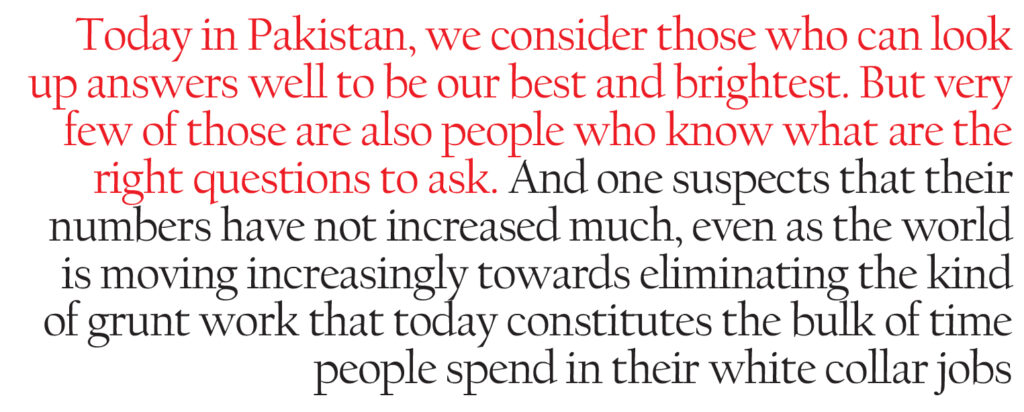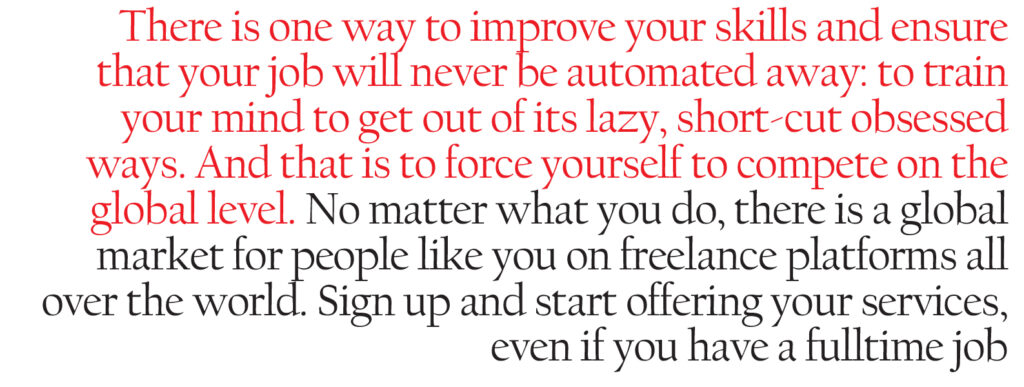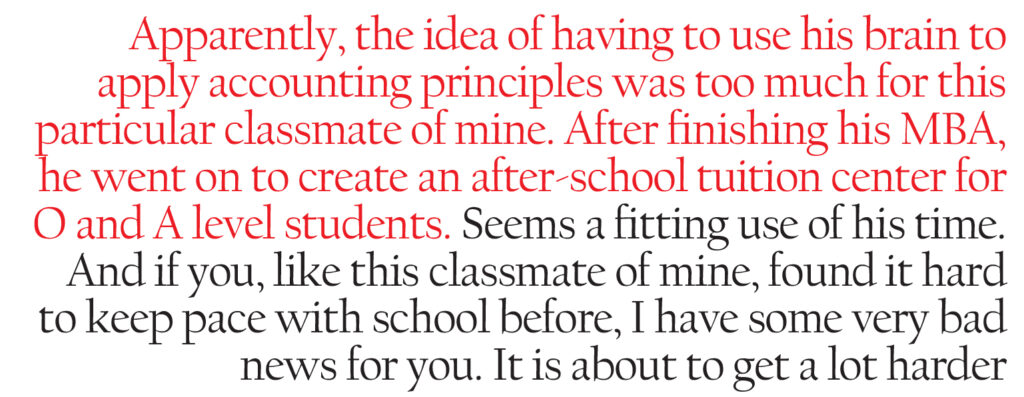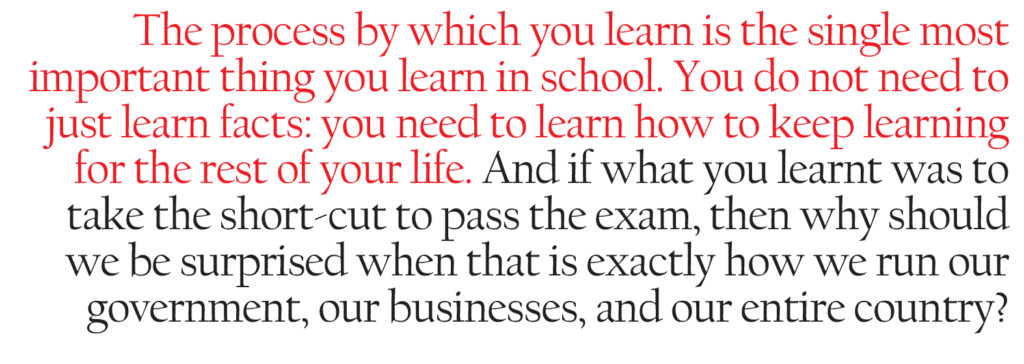Consider the following thought experiment: what would it take for a company to replace Google as the default search engine to the world? Nothing lasts forever, and while Google holds a commanding 88% share in the global market for search engines as of October 2019, nobody stays on top forever. One day, Google’s star will fade as well. So that then begs the question: how will it be done? How will the entity that overtakes Google become dominant?
While there are likely many possibilities, the one way I can think of is that it will have to be a company that fundamentally changes the nature of search itself. Searching for information right now is an exercise largely in looking for information that has already been put out on the internet by others. The search engine that eventually replaces Google will take the next logical step: it will serve your information needs not just by looking for information, but by creating it.
This is not “just another article about artificial intelligence.” It will lay out what the transition towards greater AI sophistication and use is likely to look like, and how it will affect your jobs, and what you might be able to do about it.
Before proceeding any further, it is probably important to define the terms “data”, “information”, and “knowledge”, since they are crucial to the arguments put forth here. Data is simply raw numbers or non-numerical characteristics of an entity, unprocessed, and often without context. Organised in a manner that helps answer question, even a very basic one, a collection of data becomes information. Organising a collection of information in a manner that forms a coherent structure constitutes “knowledge”.
When you search on Google today, it will provide you either with data (it will answer “Islamabad” if you search “what is the capital of Pakistan”) or with information created by others (it will list recommendations based on people’s ratings when you ask “what is the best restaurant in Islamabad”). But it cannot create new information for you.
For instance, let us suppose you are launching a financial technology startup focused on the payments needs of freelancers in Pakistan (this is a very specific example, yes, but life is lived in the specifics, not in general terms). In order to get some sense of your market size, you would need a sense of how many freelancers there are in Pakistan and what proportion of the work force they constitute.
When using Google, you can look up “number of freelancers in Pakistan” and come up with multiple results that give you estimates of that population. You can also look up “size of Pakistani labour force” and Google will provide results with estimates of the size of the labour force, including data from the World Bank and the Pakistan Bureau of Statistics.
But if you simply typed “proportion of Pakistani labour force who are freelancers”, unless someone has already calculated that number and put it up on a website somewhere, Google will not be able to figure out that all it needs to do is run those two previous searches and divide the best answer from the first one (number of freelancers in Pakistan) with the best answer from the second one (total size of Pakistani labour force).
Needless to say, if it cannot yet do that for the current year, it also cannot tell you how much that proportion has grown over time.
But someday, someone will crack the code and develop a search engine that has a natural language processing algorithm that is so good that it can process that kind of request and spit out an answer in a fraction of a second something that might take you several minutes or even an hour to calculate.

What happens to all of our jobs, especially white collar jobs, when that happens?
What happens when it goes one step further and begins integrating all known public (and maybe even some private) data sets into the search engine and able to spit out answers to even more complex questions?
For example, let us assume that you are a business analyst at FrieslandCampina Pakistan (formerly Engro Foods) and have been tasked with figuring out which product line the company should start next. There are obviously several elements to that analysis, but right now, you would probably start with looking at consumption patterns by looking up the data in the Household Integrated Economic Surveys (HIES) conducted by the Pakistan Bureau of Statistics over the past few years.
You would compile each year’s data into a format in Excel that you could use, and then you would start running the numbers to see which categories grew the fastest and which categories were the largest, etc.
But what if a search engine had fully integrated the entirety of the HIES data set into its platform and you could simply ask questions in natural language and get reliable answers? Instead of spending a whole day compiling that data, you would spend maybe an hour or so going through all of the questions you needed answers to before you would be ready to speak to your boss about what you found.
Here is where we encounter the problem for the Pakistani economy, though: most of the Pakistani workforce – including graduates of elite universities such as LUMS and IBA – are not trained to ask the relevant questions. They get paid right now because they can engage in mundane data processing and converting data into information that the handful of decision-makers use.
In other words, today in Pakistan, we consider those who can look up answers well to be our best and brightest. But very few of those are also people who know what are the right questions to ask. And one suspects that their numbers have not increased much, even as the world is moving increasingly towards eliminating the kind of grunt work that today constitutes the bulk of time people spend in their white collar jobs.
How did we get here? The answer is obvious: the flawed structure of the education system, and its inability to keep pace with technological advancement.
The school problem
The headline of this article is a little unfair to LUMS and IBA: both institutions, along with a handful of others, are leading a valiant effort in getting Pakistani students to develop critical thinking skills, the ones that will help them know what the right questions are, not just how to get the right answer to a question. But they face an uphill battle, because by the time they a student enrolls at one of these institutions, they have already had 12 years of a terrible education, which is very difficult to undo in just four years.
It is easy to say that the problem with our schools is that teach rote memorisation and studying to pass exams, but the specifics of what is lacking is exceedingly important. So here are some examples.
In April 1996, as a student of Class 6, I was asked by our teacher to “look up information on a famous scientist”. I was assigned Louis Pasteur. Now, this was 1996 when fewer than 10,000 Pakistani households had access to the internet, and even the internet back then was a much less useful thing than it is now, so this was a somewhat understandable assignment.
The objective, in that still-pre-internet world, was to teach us the skills of navigating a library, looking up the right reference books, and then knowing which section of those reference books contain the relevant information we needed. In a world where a large majority of the jobs done by white collar workers was simply looking for information, this was a useful skill to teach a student.
The problem, of course, was that both the teachers and the students were so preoccupied with the labour-intensive task of finding information that we never actually thought about what to do with that information, or what constituted useful information versus information that was not useful. We were never asked, for instance, to figure out the significance of the scientific work conducted by the person we were researching, nor what their impact was. No, just any information was enough.

What makes it worse, though, is that there are still young children who get assigned this exact same assignment, even though the year is now 2020 and most of those children have smartphones with the Wikipedia app installed on them.
And the problem only gets worse by the time you hit high school, which is especially a shame considering the fact that there are many very talented teachers who could probably do a lot better at teaching if the curriculum was better designed. Sadly, however, given the nature of high school education in Pakistan, both Matric / Intermediate students as well as O / A level students all have rigid curricula and students face pressure to get good grades on a set of final exams alone, which creates pressure to ace the exams regardless of whether one actually understands the material they are studying or not.
In short, we create a system where being a good student and being an intelligent learner are not the same thing.
One example: how many of you learnt calculus in school by learning the logic behind differentiation and integration, and how many of you simply learned to multiply the variable’s multiple with its exponent to differentiate and to reverse the process to integrate? I suspect that the overwhelming majority of you learnt it the latter way, because it was faster, easier, and still got you good grades on the exams you needed to take. That is exactly what happened to me, and I supposedly went to some of the best schools in Pakistan.
So why does it matter how I learnt certain concepts in school? Nobody ever asks us to apply those in “real life”, right?
Wrong. Very, very wrong.
The process by which you learn is the single most important thing you learn in school. You do not need to just learn facts: you need to learn how to keep learning for the rest of your life. And if what you learnt was to take the short-cut to pass the exam, then why should we be surprised when that is exactly how we run our government, our businesses, and our entire country?
Are we surprised then, that the Finance Ministry is very good at getting the numbers to look just good enough to pass muster at the quarterly inspections that the country now regularly goes through with the International Monetary Fund (IMF) but has absolutely no plan to ensure that we do not need to go to the IMF in the first place?
The Finance Ministry staff are perfect products of the Pakistani schooling system: they are very, very good at taking exams. They have absolutely no ability to understand what they are supposed to be learning in the first place.
This lack of ability to learn comes up for students who are used to take shortcuts to pass exams. I recall sitting in a classroom at IBA in the fall semester of 2011, in an accounting class, where a group of students led by one particular student decided to gang up on the professor to ask him to dramatically slow down the pace at which he was teaching the class.
The logic this student used was “sir, humari base nahin hai accounting mein.” The class was titled “Introduction to Accounting”. It was quite literally designed to create the base of accounting knowledge for business professionals. And no, the professor was a good one who taught well, so it was not a case of a bad teacher making things difficult for students.
The problem that this student – and many of my other classmates – was having was the fact that this was the heyday of Ishrat Husain’s attempts to convert IBA’s entire MBA curriculum towards the case study method favoured by Harvard Business School, where students learn business concepts by applying them directly to business cases, rather than learning the concepts in isolation and the later learning to apply them.
Apparently, the idea of having to use his brain to apply accounting principles was too much for this particular classmate of mine. After finishing his MBA, he went on to create an after-school tuition center for O and A level students. Seems a fitting use of his time.
And if you, like this classmate of mine, found it hard to keep pace with school before, I have some very bad news for you. It is about to get a lot harder.
How artificial intelligence is going to make your life easier and harder at the same time
To understand what advances in artificial intelligence will mean for your jobs, let us go back to one of the earlier examples: a business analyst at FrieslandCampina being asked to determine which products the company should launch next. In this hypothetical situation, here is how the process is likely to play out.

The CEO and management committee of the company look at the company’s financial performance – with its slowing revenue growth – and conclude that their existing product portfolio is not enough to keep growing their business. They then make the decision to study the following question: what product lines could we add to our company’s business that would best help us grow our business?
Now, to answer this question requires asking several component questions, such as: what are the fastest growing categories of food expenditures in Pakistan? Which of those categories have low penetration of packaged foods? Which of those categories do we have expertise in producing? And of all those options, which would yield the highest profits for the company?
Each of these questions requires answers that rely on crunching numbers. That subset of questions would likely be developed by somebody who is the head of business development, who in turn would pass on each of those questions on to a subordinate, who would then create a plan to answer each element of the further sub-questions embedded in those questions.
As you can see, there is a tree of questions that is being created here: each question needs to be answered by asking additional questions until you get to the most basic level at which you simply need to process raw data into useable information.
That information then gets passed back up the chain of questions until a coherent picture emerges which answers the single, basic question that was asked in the first place.
Right now, if you are a young business analyst, fresh out of your bachelors degree program, you will be asked to answer questions likely at least two to three layers deep in the analysis process. It is a labour-intensive process and the company wants to take advantage of the fact that you are cheap to employ and probably do not know much in the first place.
But what if artificial intelligence creates those tools that enable the people one level above you to do their job using an algorithm. In that case, the only business analyst the company will hire are those who can think one level above the most basic level of analysis. The one who does not just create nice Excel spreadsheets, but actually knows what to put in them, and how his or her numbers form part of a greater decision-making process.
If you are somebody who struggles with learning fast – and by fast, we mean learning something new every single day and becoming comfortable enough with it to communicate it to other people – then you will not get the job that does not require just labour. And very soon, the only good jobs will be ones that require people to be fast learners – meaning they will only be open to people who learned how to learn, not just learned how to do well on tests and exams.
The problem with LUMS, IBA, and all other Pakistani universities
And here we get to the problem with the universities in Pakistan, including the very best ones: they have a culture problem. They include among their student population several students who are genuinely interested in enriching their minds and learning ideas and tools that they plan on using their whole lives. But those students are nearly always a minority.
The vast majority of students see the university as a credential they need to get the jobs / careers / spouses that they want. (And lest you men think I am referring to women with the reference to spouses, I am not. There is not a man I know who does not think he would be more attractive to potential spouses if he had better educational credentials.)
And so, they go in with the aim of “getting through” with as little effort as possible. Hence the massive plagiarism problem at most universities, and the general inability of too many graduates of even elite institutions to hold interesting, substantive conversations.
And when people like that form the majority of an institution’s population, they get to define its culture, and they set the expectations that then, even the ones who wanted to work hard, feel they can live with. Why bother working more when I can make do with less? Why bother polishing my skills when I am surrounded by incompetent idiots and I know I can distinguish myself by doing even less than the bare minimum?
This, by the way, is the reason behind the famous “arrogant LUMS graduate” problem: they are arrogant and lazy because they can be. If they faced serious competition from other institutions, they would lose that attitude in a minute.

But see, artificial intelligence will mean that competition will come not just from other human beings at other institutions, but also well-designed algorithms. And unfortunately, these institutions – though they are trying – are still largely places that snuff out the desire to intellectually engage with ideas and learning tools.
The fear of being replaced with a machine has yet to pervade these campuses, which means that precious few new employees are ill prepared for the workplace of the future.
So how should you deal with this?
But what can you do now? You already have a bad education and you know it. A graduate of a foreign university sitting abroad and writing this screed will not help you, and will only make you hate him more than you already did before.
But there is one way to improve your skills and ensure that your job will never be automated away: to train your mind to get out of its lazy, short-cut obsessed ways. And that is to force yourself to compete on the global level. No matter what you do, there is a global market for people like you on freelance platforms all over the world. Sign up and start offering your services, even if you have a fulltime job.
This approach has two benefits: firstly, it makes you some extra money. And secondly, it will force you to engage with cutting edge trends in your field of work, and may even open up opportunities for you in entirely new fields of work. If you are competing against the best in the world, it will force you to learn how to become better, and in turn will make you a more well-rounded professional at home as well.
For the first time in history, you no longer need to emigrate to another country to compete at the global level. You can do it out of your own home, right here in Pakistan. All you need is a laptop and functioning WiFi.
A world dominated by artificial intelligence will not be a comfortable one for many people. But it is entirely navigable, if only one is willing to put in the effort.





















What, you were in Class 6 in 1996? Unless you have copy pasted that story from someone else, you look 20 years older than your age man! I thought you were like 50 or something.
While many may hate you for this account, I just woke up to this article and trust me it made my day. I am certain they will hate you for a reason since you had been so good at belittiling their empty educational credentials and institutional arrogance, corroborating it with the reality of what may comes ahead as technology unfolds itself. Sticking to mere arrogant ambiance of such schools, potraying that they are the best products in the country is not going to cut it unless they get to dig deeper and ask themseleves this question “Am I that good the way I pretend to be”.
Its good effort…
Great article.
mr shahid I’m not agree with you , but yes he’s look like a ‘dr rustum’ character of munna bhai mbbs. jaisay exam mai koi bheta ho or photo bhai ka hoo.
CORRECT, it is time to wake up as world is changes very fast and technology is facilitating this change. Keep learning fast and think global there are NO shortcuts.
Interesting read but I do not see how AI would challenge human beings on a large scale… I just do not see it happening considered the distrustful nature of humans
This is so apt and thoroughly put and the its flawless picurization of Pakistan’s academic climate is an eye opener. The process of scholarship and learning is far more important than the facts themselves.
On a side note, this emerging AI revolution & automation, coupled with economic recession really presents a grim picture for Pakistani youth which forms the 70%+ of Pakistan’s population and is completely unprepared to take on the looming challenges.
Great way to clickbait buddy. Now you have the attention of LUMS and IBA grads.
Now, coming to your article. It does not deserve to be a cover story. It is your opinion, parading as a story. Almost all your articles are. Please start putting them in the Opinion section. You have good writing and research skills, but you really need to bring your arrogant ass back to the ground.
Chal pan yaka kam kar
From what I just read, it’s pretty clear you have no clue about IBA or LUMS, or its students.
Came to comment section before the actual article. Good decision.
I woke up to this but I must say that the article was a pleasure to read. Keep it up Farooq tirmizi sahab!
Nice Article. However, I really want to ask what you think about the future of Data Science. With majority of the project times being spent on Data Wrangling and Cleaning Efforts, how do you think development of AI Algorithms that traverse data intelligently to provide solutions will affect this domain?
A bit too much opinion involved in this article. There’s no 2nd side of the story in this case. The fact that most MBAs are suffering from lack of jobs not just LUMs and IBA grads. Clickbait to get attention and then a multi paragraph introduction about why our education system isn’t good enough. Narcissistic “ME” complex in which you’re using these articles to regale your own memories instead of constructive journalism. IBA and LUMS walo, writer bn jao boht scope hai. Btw, I wasn’t even able to get to the end, the yawning was too severe by that time.
Absolute Brilliance Farooq Bhai. What an article.
excellent article. Thanks for your suggestion to compete with global level workforce. Indeed our system is flawed. its does not teaches us to think out of box. but we as individual would have to make sure that we are competing with global market
Excellent article, rude awakening for many .
set a side all other thing, but it should be a wake up call. Things are moving fast and technology is eating up many traditional skills. its time to move to that direction.
A high-level critical article , I am sure would change the mind-set if taken to the merit. It is one of the our national problem, that we see criticism in negative perspective which is not good for the future. I am sure this is wonderful article, though some aspects may be debatable no doubt, will become a eye-opener. I think it will suffice for the real MBAS from these respected universities who are eager to learn instead of looking at the piece of paper we call a degree. In international arena they are nothing until and unless criticism welcomed and be taken in true perspective. Thank Again. Well done. Imtiaz Hussain, Attorney and Management Consultant, Founding President IH Consulting Group Karachi
“Here is where we encounter the problem for the Pakistani economy, though: most of the Pakistani workforce – including graduates of elite universities such as LUMS and IBA – are not trained to ask the relevant questions. They get paid right now because they can engage in mundane data processing and converting data into information that the handful of decision-makers use.”
Lol what?
These all arguments are highly flawed and fallacious.
Your most of the claims have no evidence supporting them. A fancy style with language doesn’t make you eligible to write up posts on internet.
Your arguments are neither cogent nor sound.
“Right now, if you are a young business analyst, fresh out of your bachelors degree program, you will be asked to answer questions likely at least two to three layers deep in the analysis process. It is a labour-intensive process and the company wants to take advantage of the fact that you are cheap to employ and probably do not know much in the first place.”
This all what you mention is the basic thing that almost 90percent of the lums business graduate does quite efficiently. Next time you point out names, do show up with your references.
It is very ugly seeing that you use the names of elitest universities of Pakistan to get readers to your artile, yet then you write stupid weak arguments.
well written
Good writing, impressive
Well written content
Rubbish!
Both have great alumni until merit was given due preference. Then, self-finance system created decline in quality of graduates as well as faculty. More than 90% faculty with so called PhDs have no real world business exposure, only to start teaching after reaching a limit of amassing terminal degrees.
Higher Ed is now the only field left where a learner has no option but to learn from someone who has no experience, this is more so in business education where practical knowledge and practice turns into theory, unlike laboratory research in other fields. And substandard PhDs teaching business is farce and travesty of business education. In Europe and America, experts are increasingly teaching in business schools and students are rejecting PhD professors having no real knowledge or experience.
Comments are closed.